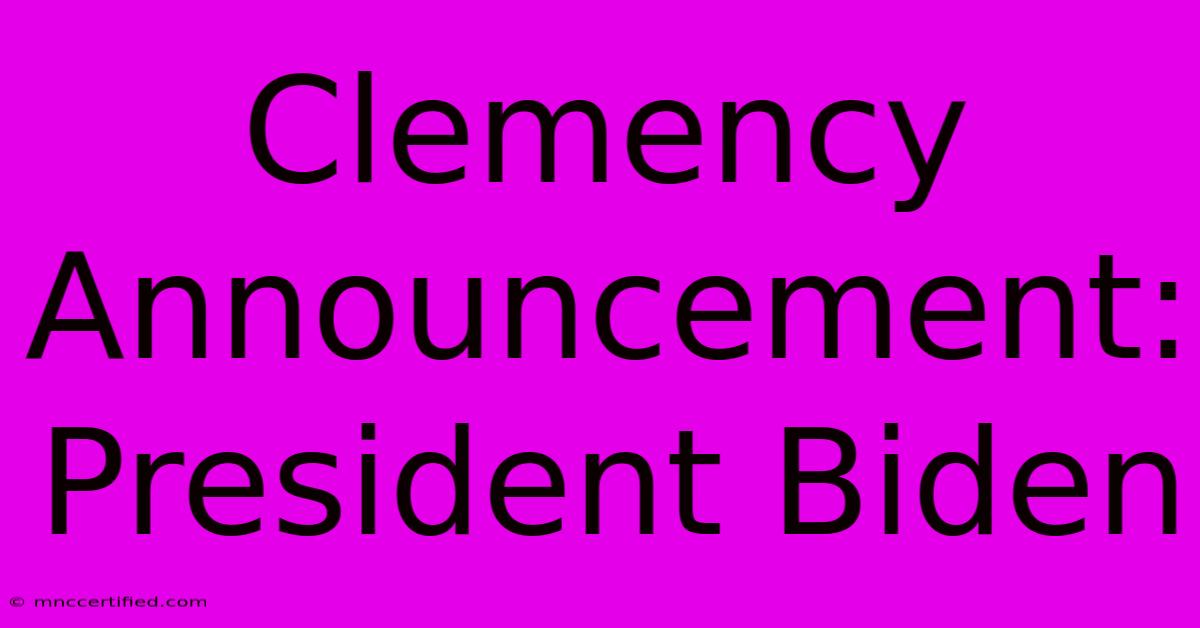Clemency Announcement: President Biden

Table of Contents
Clemency Announcement: President Biden – A Deeper Dive into the Pardons and Commutations
President Biden's clemency announcements have sparked significant discussion, raising questions about the process, the individuals affected, and the broader implications of executive clemency. This article delves into the details of these announcements, exploring the criteria used, the impact on those granted clemency, and the ongoing debate surrounding the use of presidential pardon power.
Understanding Presidential Clemency: Pardons and Commutations
Presidential clemency encompasses two primary actions: pardons and commutations. A pardon forgives a federal crime, essentially wiping the conviction from a person's record. A commutation, on the other hand, reduces a sentence, but the conviction remains. Both actions are powerful tools wielded by the President, reflecting their role as the head of the executive branch and the ultimate arbiter of justice within the federal system.
Key Considerations in Clemency Decisions
The criteria considered when granting clemency are complex and often opaque. While no single, publicly available checklist exists, factors generally include:
- Nature of the Offense: The severity of the crime and the circumstances surrounding it are crucial. First-time, non-violent offenders often receive more favorable consideration.
- Rehabilitation and Good Conduct: Demonstrated remorse, successful reintegration into society after serving a portion of the sentence, and evidence of rehabilitation are frequently weighed heavily.
- Disparate Sentencing: Cases where sentencing disparities exist, particularly involving racial bias in the judicial system, often form a basis for clemency.
- Exceptional Circumstances: Unique situations, such as extenuating medical conditions or extraordinary family circumstances, might sway decisions.
- Public Opinion: While not an explicit criterion, public sentiment surrounding a case and broader calls for justice reform can influence the President's decision.
President Biden's Clemency Announcements: A Case Study
President Biden's clemency announcements represent a significant use of executive power, signaling a commitment to criminal justice reform. These announcements frequently target individuals convicted of non-violent drug offenses, reflecting a broader national shift in drug policy and a growing recognition of the disproportionate impact of harsh sentencing on marginalized communities.
Analyzing the Impact
The impact of these actions is multifaceted:
- Individual Relief: For those granted clemency, the relief can be transformative, allowing them to rebuild their lives free from the stigma and legal restrictions of a criminal record.
- Systemic Change: The announcements serve as a powerful statement, highlighting flaws within the justice system and advocating for a more equitable and humane approach to sentencing.
- Political Implications: The use of presidential clemency often attracts political scrutiny, with debates emerging regarding the appropriateness of certain grants and the potential influence of partisan considerations.
The Ongoing Debate and Future of Clemency
The President's use of clemency power remains a subject of ongoing debate. Critics often raise concerns about:
- Transparency: Lack of detailed explanations for specific clemency decisions can lead to accusations of favoritism or arbitrary decision-making.
- Consistency: Ensuring consistent application of clemency criteria across all cases is a challenge, requiring a robust and transparent review process.
- Potential for Abuse: The vast power vested in the President to override judicial decisions necessitates careful consideration of potential abuses and the need for strong checks and balances.
Improving the Clemency Process:
Several reforms could improve the clemency process and enhance its fairness and transparency:
- Establishing a clearer, more standardized set of criteria.
- Creating an independent review board to assess clemency applications.
- Increasing public transparency surrounding the review and decision-making process.
President Biden’s clemency initiatives represent a crucial aspect of his broader criminal justice reform agenda. Ongoing analysis of these actions, coupled with efforts to improve the clemency process, will be vital in shaping future discussions about executive power and its role in promoting justice and fairness within the American legal system. Further research into the specifics of each individual case granted clemency will yield a more comprehensive understanding of the President's approach and its impact.

Thank you for visiting our website wich cover about Clemency Announcement: President Biden. We hope the information provided has been useful to you. Feel free to contact us if you have any questions or need further assistance. See you next time and dont miss to bookmark.
Featured Posts
-
Asian Hornet Spread Halted In Uk
Dec 13, 2024
-
Elden Ring Nightreign Co Op Expands
Dec 13, 2024
-
93 7 The River Sach Vai Returns With Doc Reno
Dec 13, 2024
-
Greenlaws Return A Warner Reunion
Dec 13, 2024
-
Wallen Serves Dui Sentence At Center
Dec 13, 2024